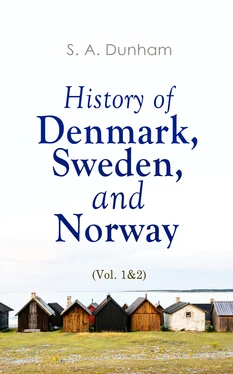S. A. Dunham - History of Denmark, Sweden, and Norway (Vol. 1&2)
Здесь есть возможность читать онлайн «S. A. Dunham - History of Denmark, Sweden, and Norway (Vol. 1&2)» — ознакомительный отрывок электронной книги совершенно бесплатно, а после прочтения отрывка купить полную версию. В некоторых случаях можно слушать аудио, скачать через торрент в формате fb2 и присутствует краткое содержание. Жанр: unrecognised, на английском языке. Описание произведения, (предисловие) а так же отзывы посетителей доступны на портале библиотеки ЛибКат.
- Название:History of Denmark, Sweden, and Norway (Vol. 1&2)
- Автор:
- Жанр:
- Год:неизвестен
- ISBN:нет данных
- Рейтинг книги:5 / 5. Голосов: 1
-
Избранное:Добавить в избранное
- Отзывы:
-
Ваша оценка:
- 100
- 1
- 2
- 3
- 4
- 5
History of Denmark, Sweden, and Norway (Vol. 1&2): краткое содержание, описание и аннотация
Предлагаем к чтению аннотацию, описание, краткое содержание или предисловие (зависит от того, что написал сам автор книги «History of Denmark, Sweden, and Norway (Vol. 1&2)»). Если вы не нашли необходимую информацию о книге — напишите в комментариях, мы постараемся отыскать её.
The Pagan Age:
Denmark (B.C. 40 to A.D. 1014)
Sweden (A.C. 70 to A.D. 1001)
Norway (about A.C. 70 to A.D. 1030)
Maritime Expeditions of the Northmen During the Pagan Times:
In England, France, and Ireland
Maritime Expeditions of the Northmen During the Pagan Times:
In the Orkneys, the Hebrides, Iceland, Greenland, North America, Russia, etc.
Cosmogony and Religion of Scandinavia
Introduction of Christianity Into Denmark and Sweden
The Middle Age:
Denmark (1014-1387)
Norway (1030-1387)
Sweden (1001-1389)
History of Denmark, Sweden, and Norway (Vol. 1&2) — читать онлайн ознакомительный отрывок
Ниже представлен текст книги, разбитый по страницам. Система сохранения места последней прочитанной страницы, позволяет с удобством читать онлайн бесплатно книгу «History of Denmark, Sweden, and Norway (Vol. 1&2)», без необходимости каждый раз заново искать на чём Вы остановились. Поставьте закладку, и сможете в любой момент перейти на страницу, на которой закончили чтение.
Интервал:
Закладка:
Gray has immortalised. It is among the most imaginative efforts of the Scandinavian muse. [51]
According to Saxo, it was not the mystic Vala, but Rostiof, king of the Finns, who foretold that Odin’s son, by Rinda, should avenge the death of Balder. That Odin, who was esteemed chief of the gods, should be less prescient than a Finnish king, may appear strange; but this term god frequently means no more than Goth, and the chief of the gods means only the head of the pontifical college established, first in Asia, and next in Sweden. And we must remember that the Finns were expressly declared to be unrivalled in magic, at least in that dark magic which sought the injury of mankind. Yet Odin was equally malignant. He could not rest until he had discovered the maiden whose offspring was thus predestined to accomplish his purpose. This Rinda was a princess, and, consequently, demanded more attention than one of humbler birth. The disguises which he successively assumed at her father’s court; his frequent repulses by her; his numerous stratagems, and his ultimate triumph under the character of a physician; are gravely related by the venerable historian of Denmark. His conduct on these occasions was so unworthy of a god, that his colleagues at Byzantium (or we should rather suppose Asgard) removed him for a time from their society, deprived him of his supernatural powers, degraded him to the level of mortals, and sentenced him to exile—a doom which he, therefore, suffered a second time, though on the former occasion it had been self-imposed. [52]All this, in plain English, means that he was expelled from the college of priests. This natural explanation is confirmed by the statement, that in ten years, the gods, pitying his sufferings, or, perhaps, bribed by flattery and costly gifts, restored him to all his former privileges. Lest the public worship should sustain any injury, his place had been supplied by one Oller, a priest so expert in magic that he could cross the seas on a bone; but this usurper was slain by the Swedes, just as Mitothin had been slain. In the mean time Bo, the issue of Odin’s connection with Rinda, grew up, and was intrusted by the father with the sacred task of revenge. Accordingly he advanced against the Danish king. Hoder foresaw his doom; and, in an assembly of chiefs, he prevailed on them to elect his son, Runi, for his successor. In the battle which followed destiny was fulfilled: he fell by the hand of Bo; but the victor also received a mortal wound and died the following day. [53]
All that we have farther to say respecting Odin, in the present Introduction, may be despatched in a few words. Perceiving his end approach, he marked his body with a sword, probably to denote the advantage of dying by that weapon; and declared that he was going to Godheim or paradise, where he should joyfully receive his people. The Swedes were persuaded that he was returned to Asgard to enjoy eternal life; and in this belief his worship was renewed and enlarged. In time of war, and before great battles, he often appeared to them, promising victory to some, inviting others to his hall—in both respects the harbinger of good. After death he was placed on the funeral pyre, and burnt with exceeding pomp. His followers believed the higher the smoke ascended the higher would be his place among the gods; and that the more abundant the riches consumed with him the richer he would be in the other world. [54]
From the concurrent testimony of Snorro, Saxo Grammaticus, and the two Eddas, little doubt can be entertained in regard to the true character of Odin. He was evidently a conqueror, a king, a priest, a lawgiver, and an adept in the superstitious practices of his age. Endued with commanding talents and an unmeasured ambition, he was enabled to take advantage of circumstances in a degree seldom attained by mortals. Perceiving the success which attended his views, and the veneration in which his wisdom was held, he did not hesitate to ascribe both to the peculiar favour of the gods, from whom, like most of the Scythian princes, he boasted of his descent. As he was of divine race, why should he not participate in the privileges of divinity? Short, indeed, is the transition from veneration to actual worship; and there can be little doubt that, even in his lifetime, this artful pontiff king had altars smoking in his honour. But it is worthy of remark that he was often regarded as a mortal, not merely in his own age, but in subsequent ages; that the words giants and gods are to be understood of the Jutes and Goths—the former, the original possessors of the soil, the latter, the victorious strangers from Asia—the dominant caste which arrogated to itself the sacerdotal and regal functions, and thus preserved its empire over the barbarous, enslaved population. It was some time after his death before his worship was general in the north; and never would it have been general had he not been esteemed the god of war, the deity above all others dear to the ferocious Northmen. Even as it is, he did not hold the highest rank in the worship of all the Scandinavian nations. The Norwegians held him inferior to Thor. Still he is by far the most remarkable person that ever took advantage of human credulity. Over a considerable portion of Europe his worship was extended; and it was not a transitory worship; for it prevailed, in Germany, far into the ninth century; in Denmark and Sweden, a century later; and in some parts of Norway it was not extinct in the twelfth. Of the religion, however, which he founded, or which he incorporated with the superstition already subsisting on his arrival in the north, we shall speak in a future chapter.
On the death of Hoder, the sceptre of Denmark, or rather of a portion of Denmark, passed into the hands of his son Ruric . The name of this prince is interesting to an Englishman, from the fact that the alleged events on which the tragedy of Hamlet is founded happened in his reign. According to Saxo, Hamlet was not the son of a Danish king. His father was Horwendil, governor of Jutland, a famous pirate and vassal of Ruric; but the authority was not undivided: it was shared by Fengo, brother of Horwendil. Fengo did nothing to merit the favour of Ruric; but Horwendil was so valiant and able, that he was honoured with the hand of Gertrude, daughter of the Danish king. From this marriage sprung Hamlet, whose history is so famous in the traditions of Denmark. Fengo could not, without envy, behold the good fortune of his brother: envy led to hatred, and hatred to fratricide. After this deed he married the widowed Gertrude, and succeeded to the whole government of Jutland. Hamlet was no inattentive observer of these events. As a pagan, his first duty was to revenge his father’s death: a duty, to the force of which his uncle was fully alive, and watchful to frustrate it. Spies being set on all his actions, he feigned madness; he painted his face, put on a strange garb, and uttered the most ridiculous things. Frequently was he to be seen on the hearth, seated among the ashes, and making wooden hooks, which he hardened by the heat. His madness, however, had method in it; and some of his replies, ridiculous as they seemed, made the experienced doubt whether he should be classed among the wisest or the most foolish of mankind. “For what purpose are these hooks?” was one day demanded of him. “For the revenge of my father!” was the answer. As nobody could see how they could effect that purpose, he was ridiculed by all but the discerning, who supposed that beneath this ostentatious display of insanity, a profound object was concealed. Among these, was jarl Fengo, who, wishing to prove whether the suspicions were well or ill-founded, had recourse to an expedient. The disposition of the prince was exceedingly amatory; and it was thought that, if a young handsome female were sent to him, he would betray himself. The meeting was to be effected in a wood, and spies were to be placed near him. On the day appointed, he was commanded to ride into a forest. As usual, he mounted with his face to the tail, which he held in lieu of a bridle. There he found the woman; and would have immediately betrayed himself, had not his foster-brother obscurely hinted that he should beware. The way in which this intimation was communicated, like many other parts of Saxo’s narrative, is too gross for translation. Enough to know, that Hamlet was made to understand the danger of his situation. Among his virtues, chastity was not to be reckoned; and though the instances of its violation cannot be recorded in these times, we may observe that, even on the occasion before us, he indulged his propensity, and was cunning enough to conceal it. Fengo, therefore, was disappointed; but by the advice of a friend, he had recourse to another expedient. Under the pretext of a long absence on affairs of moment, he left the palace, and provided that Hamlet should be brought into the mother’s presence, while a spy, unknown to both, should be near them, to hear every word that he should utter. If he had any reason left, it was not doubted he would be communicative with one whom he loved, and who he knew would never betray him. At the time appointed, the courtier hastened to the apartment, where mother and son were to meet, and hid himself under a heap of straw that accidentally lay there—a curious illustration of domestic economy in that age. Immediately afterwards, Hamlet and Gertrude arrived; but the former was too much aware of the dangers which involved him to indulge in rational conversation with his mother, until he had examined the locality. Imitating the crowing of a cock—an imitation in which he was singularly successful—and waving his arms as if they were wings, he leaped on the straw, and was immediately sensible that something lay beneath. With his sword he despatched the intruder. After this act, while his mother was bewailing his supposed insanity, he fiercely upbraided her for her incestuous marriage with the murderer of her first husband. This double crime he did not assail exactly in the manner represented in the drama, but in one more conformable with the barbarism of the age, that is, in one of exceeding coarseness. [55]His remonstrances are said to have kindled the sparks of virtue in her heart; but the sequel ill corresponded with this moral intention, or with the refined character which the dramatist has given him. The man whom he had killed he cut in pieces, boiled the members, and threw them into the sewer to be eaten by the swine. When Fengo returned, great was his surprise to find that his courtier had disappeared—that not the slightest trace of him could be discovered. One day Hamlet, who was regarded as no more than a motley fool, and to whom questions were put for amusement only, being asked what had become of his uncle’s friend, replied, “He fell into the common sewer, and being unable to extricate himself, was found, and eaten by the swine!” His reply furnished some amusement to the hearers, who regarded it as a good motley invention. They did not know that on all occasions, whether grave or trivial, Hamlet spoke the truth. [56]
Читать дальшеИнтервал:
Закладка:
Похожие книги на «History of Denmark, Sweden, and Norway (Vol. 1&2)»
Представляем Вашему вниманию похожие книги на «History of Denmark, Sweden, and Norway (Vol. 1&2)» списком для выбора. Мы отобрали схожую по названию и смыслу литературу в надежде предоставить читателям больше вариантов отыскать новые, интересные, ещё непрочитанные произведения.
Обсуждение, отзывы о книге «History of Denmark, Sweden, and Norway (Vol. 1&2)» и просто собственные мнения читателей. Оставьте ваши комментарии, напишите, что Вы думаете о произведении, его смысле или главных героях. Укажите что конкретно понравилось, а что нет, и почему Вы так считаете.












